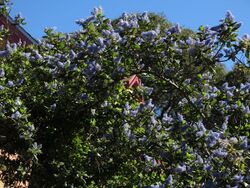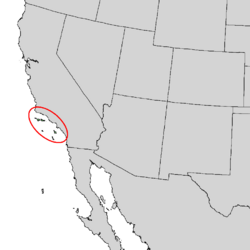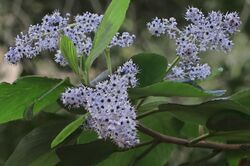Biology:Ceanothus arboreus
| Ceanothus arboreus | |
|---|---|

| |
| Scientific classification | |
| Kingdom: | Plantae |
| Clade: | Tracheophytes |
| Clade: | Angiosperms |
| Clade: | Eudicots |
| Clade: | Rosids |
| Order: | Rosales |
| Family: | Rhamnaceae |
| Genus: | Ceanothus |
| Species: | C. arboreus
|
| Binomial name | |
| Ceanothus arboreus Greene[2]
| |

| |
| Natural range of Ceanothus arboreus | |
Ceanothus arboreus is a species of perennial shrub to small tree in the family Rhamnaceae, commonly known as the feltleaf ceanothus, island ceanothus, and island mountain lilac.[3][4] It is the largest member of the California lilacs (the Ceanothus genus), and is characterized with glossy, dark green foliage that is adorned by pale blue to white flowers in bloom. It is endemic to the Channel Islands of California and Guadalupe Island in Mexico,[5] only being re-discovered on Guadalupe Island after the elimination of feral goats.[6]
Description
Ceanothus arboreus is a spreading bush growing up to 12–36 feet (3.7–11.0 m) in height.[7] It has large, glossy, dark green leaves which are leathery or felt-like on their undersides.[7]
Its showy bright blue flowers grow in plentiful panicles, or bunches, of tiny five-lobed blossoms.[7] Some varieties and cultivars have light, powder purple blooms, and others bear darker purple flowers. The bloom period is February to April.[3]
The fruits are three-lobed, triangular capsules.[7]
Distribution
The plant is endemic to three of the Channel Islands of California: Santa Cruz Island, Santa Rosa Island, and Santa Catalina Island,[3][7] and it is also found on Guadalupe Island in Mexico.[5]
It is found on slopes in coastal sage scrub and chaparral habitats.[3]
Cultivation
'Ceanothus arboreus is cultivated as an ornamental plant for use in drought tolerant and wildlife gardens and natural landscaping projects.[8][9] Butterflies like the flowers and the quail eat the seeds.[8]
Cultivars
Numerous cultivars have been selected for garden use, including:
- Ceanothus arboreus 'Cliff Schmidt' — more compact habit and deeper blue flowers.[10]
- Ceanothus arboreus 'Owlswood Blue'.[11]
- Ceanothus arboreus 'Powder Blue' — Powder Blue Ceanothus, Compact Feltleaf Ceanothus.[12][13][14]
- Ceanothus arboreus 'Skylark'
- Ceanothus arboreus 'Trewithen Blue' — very dark blue flowered form from the Channel Islands.[15] It has received the Royal Horticultural Society's Award of Garden Merit.[16]
See also
- Endemic flora of California
- Natural history of the Channel Islands of California
- Flora of the California chaparral and woodlands
References
- ↑ "NatureServe Explorer". NatureServe. 2022. https://explorer.natureserve.org/Taxon/ELEMENT_GLOBAL.2.130731.
- ↑ C. arboreus was first described and published in Bulletin of the California Academy of Sciences, 2(6): 144. 1886. "Plant Name Details for Ceanothus arboreus". IPNI. http://www.ipni.org:80/ipni/idPlantNameSearch.do?id=716754-1. Retrieved August 22, 2010.
- ↑ 3.0 3.1 3.2 3.3 Calflora: Ceanothus arboreus
- ↑ GRIN-Global Web v 1.9.6.2: taxonomy of Ceanothus arboreus
- ↑ 5.0 5.1 Rebman, J. P.; Gibson, J.; Rich, K. (2016). "Annotated checklist of the vascular plants of Baja California, Mexico". San Diego Society of Natural History 45: 241. http://sdplantatlas.org/pdffiles/BajaChecklist2016.pdf.
- ↑ Luna-Mendoza, Luciana; Aguirre-Muñoz, Alfonso; Hernández-Montoya, J.C.; Torres-Aguilar, Marisol; García-Carreón, Jacinto; Hernandez, Orlando; Luvianos-Colin, Sergio; Cárdenas, Ana et al. (2019). "Ten years after feral goat eradication: the active restoration of plant communities on Guadalupe Island, Mexico". Occasional Paper SSC 62: 571–575. https://www.researchgate.net/publication/331939753_Ten_years_after_feral_goat_eradication_the_active_restoration_of_plant_communities_on_Guadalupe_Island_Mexico.
- ↑ 7.0 7.1 7.2 7.3 7.4 Jepson eFlora: Ceanothus arboreus
- ↑ 8.0 8.1 Las Pilitas Nursery Horticultural Database: Ceanothus arboreus (Tree Lilac, Island Mt. Lilac)
- ↑ Lady Bird Johnson Wildflower Center Native Plant Information Network−NPIN: Ceanothus arboreus (Feltleaf ceanothus, Island ceanothus, Island mountain lilac)
- ↑ Buena Nursery native plants database: Ceanothus arboreus 'Cliff Schmidt'
- ↑ Las Pilitas Nursery Horticultural Database: Southern California Lilacs, Ceanothus spp. and cultivars.
- ↑ San Marcos Growers Horticulture Database: Ceanothus arboreus 'Powder Blue'
- ↑ The Santa Barbara Botanic Garden.org: Ceanothus 'Powder Blue' — with images.
- ↑ Yerba Buena Nursery native plants database: Ceanothus arboreus 'Powder Blue'
- ↑ Yerba Buena Nursery native plants database: Ceanothus arboreus 'Trewithen Blue'
- ↑ "RHS Plant Selector - Ceanothus arboreus 'Trewithen Blue'". https://www.rhs.org.uk/Plants/3253/Ceanothus-arboreus-Trewithen-Blue/Details. Retrieved 15 April 2020.
External links
- Calflora Database: Ceanothus arboreus (Catalina ceanothus, Feltleaf ceanothus, Island ceanothus)
- Jepson Manual eFlora (TJM2) treatment of Ceanothus arboreus
- USDA Plants Profile for Ceanothus arboreus (feltleaf ceanothus)
- UC Photos gallery of Ceanothus arboreus (Feltleaf Ceanothus)
Wikidata ☰ Q5055701 entry
 |



